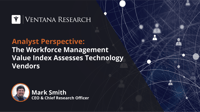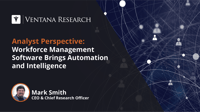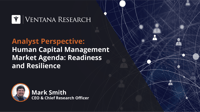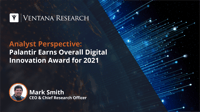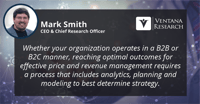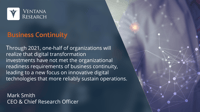I am happy to share insights gleaned from our latest Value Index research, an assessment of how well vendors’ offerings meet buyers’ requirements. The Ventana Research Value Index: Workforce Management 2022 is the distillation of a year of market and product research by Ventana Research. Drawing on our Benchmark Research, we apply a structured methodology built on evaluation categories that reflect the real-world criteria incorporated in a request for proposal to workforce management vendors...
Read More
Topics:
Human Capital Management,
Learning Management,
Talent Management,
Workforce Management,
Payroll Management,
Total Compensation Management,
employee experience
Workforce management processes and activities, a major focus of investment and optimization efforts for decades, have undergone a huge transformation in recent years. In our view, this is mostly a function of two significant trends: the explosion of technology innovation associated with the use of artificial intelligence, machine learning and embedded analytics in many areas of a business including a range of human capital management processes and operations; and a major reframing of the...
Read More
Topics:
Human Capital Management,
Learning Management,
Talent Management,
Workforce Management,
Payroll Management,
Total Compensation Management,
employee experience
Ventana Research recently announced its 2022 Market Agenda for Human Capital Management, continuing the guidance we’ve offered for two decades to help organizations derive maximum potential from workforce- and people-related technology investments and initiatives. In crafting this Market Agenda, we focused on three critical themes top-of-mind for both HCM vendors and buyers: Organizational readiness, workforce resilience utilizing digital technology to increase retention, and advance worker...
Read More
Topics:
Human Capital Management,
Learning Management,
Workforce Management,
Payroll Management,
Total Compensation Management,
employee experience,
candidate engagement
The annual Ventana Research Digital Innovation Awards showcase advances in the productivity and potential of business applications, as well as technology that contributes significantly to the improved processes and performance of an organization. Our goal is to recognize technology and vendors that have introduced noteworthy digital innovations to advance business and IT.
Read More
Topics:
Sales,
Customer Experience,
Human Capital Management,
Marketing,
Office of Finance,
Voice of the Customer,
Continuous Planning,
embedded analytics,
Learning Management,
Analytics,
Business Intelligence,
Collaboration,
Data Governance,
Data Preparation,
Information Management,
Internet of Things,
Business Planning,
Contact Center,
Data,
Product Information Management,
Sales Performance Management,
Workforce Management,
Financial Performance Management,
Price and Revenue Management,
Digital Technology,
Digital Marketing,
Digital Commerce,
Operations & Supply Chain,
Enterprise Resource Planning,
ERP and Continuous Accounting,
Revenue,
blockchain,
natural language processing,
data lakes,
Total Compensation Management,
robotic finance,
Predictive Planning,
employee experience,
candidate engagement,
Conversational Computing,
Continuous Payroll,
collaborative computing,
mobile computing,
continuous supply chain,
Subscription Management,
agent management,
extended reality,
intelligent marketing,
sales enablement,
work experience management,
lease and tax accounting,
AI & Machine Learning,
robotic automation
Economic dynamics and market pressures during a black-swan event can wreak havoc on efforts to effectively manage revenue operations and pricing for business continuity. For many organizations, environmental changes disrupt the methods by which these essential business processes are managed can be disrupted, damaging the revenue streams that create profitability. The array of pricing strategies and related promotional tactics across channels for configure, price and quote (CPQ), digital...
Read More
Topics:
Sales,
Customer Experience,
Human Capital Management,
Marketing,
Analytics,
Business Intelligence,
Collaboration,
Internet of Things,
Data,
Product Information Management,
Sales Performance Management,
Workforce Management,
Workforce Planning,
Price and Revenue Management,
Total Compensation Management,
Conversational Computing
Over the past several months, I have discussed a wide range of topics that organizations must consider and appropriately prioritize to maintain business continuity during periods of upheaval. But sometimes it’s important to take a step back and reflect on a critical and recurring theme: experiences. The array of experiences across the workforce and business processes both inside and outside of the organization are an essential part of an organization’s success. Leadership must give these...
Read More
Topics:
Sales,
Customer Experience,
Human Capital Management,
Marketing,
Office of Finance,
Analytics,
Business Intelligence,
Collaboration,
Internet of Things,
Data,
Sales Performance Management,
Workforce Management,
Workforce Planning,
Operations & Supply Chain,
Total Compensation Management,
Conversational Computing
Business planning is an essential part of an organization’s focus on its future performance and overall potential because it ensures continuous operations, even in black-swan events. Planning across the entire organization needs to be a critical priority and leadership should give it the attention it deserves. In challenging times, a focus on execution tends to take hold — this is not unreasonable but in focusing on satisfying immediate customer and workforce needs and putting out fires,...
Read More
Topics:
Sales,
Human Capital Management,
Office of Finance,
Continuous Planning,
Analytics,
Business Intelligence,
Collaboration,
Internet of Things,
Data,
Sales Performance Management,
Workforce Management,
Financial Performance Management,
Price and Revenue Management,
Operations & Supply Chain,
Enterprise Resource Planning,
ERP and Continuous Accounting,
Total Compensation Management,
Predictive Planning,
Conversational Computing
